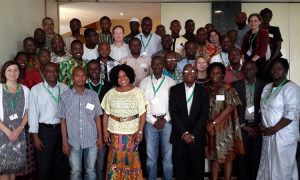By Hannah Parker, Walker Institute, University of Reading
During the wet season of 2012 heavy rainfall across West Africa led to flooding with devastating impacts. More than 3 million people were affected, with hundreds of thousands made homeless (Figure 1). When extreme events such as this occur, it is important to question whether climate change had a role to play. At the Walker Institute we have investigated the impact of climate change on this event, by assessing whether the probability of such high precipitation in the 2012 rainy season was affected by anthropogenic emissions.

Impacts of heavy rainfall-induced flooding across West Africa in 2012
Observations show that there was anomalously high rainfall across much of West Africa during the 2012 rainy season. To look at changes in the probability of such high precipitation, we used hundreds of climate model simulations of the year 2012. By comparing simulations with and without anthropogenic greenhouse gas emissions, we were able to assess whether the probability of the event had been changed.
We found that the probability of such high precipitation in West Africa had been decreased by climate change. This was the case under both general climate conditions (using simulations with the atmosphere coupled to the ocean, therefore including all climate variability), and with conditions specific to 2012 (using atmosphere-only simulations with observed sea surface temperatures (SSTs)). Using different model ensembles, the decrease in probability was found to between a factor of 0 and 16.
However we also found some disagreement between the climate model ensembles. When considering the world without anthropogenic emissions, in the atmosphere-only simulations the effect of anthropogenic emissions had to be removed from the SSTs as well as the atmosphere. We estimated the effect on SSTs using coupled climate model simulations, which showed a decrease in the probability of high precipitation in 2012. However we also used an estimate based on the observed trend in SSTs, and in this case the probability of high precipitation was shown to have been decreased by anthropogenic emissions. Further analysis showed that this discrepancy was likely due to the climate models having much greater warming trends than observations did in the Niño3.4 region in the Pacific Ocean.
Understanding how individual events such as this have been affected by climate change is relevant for policymakers to better understand climate change impacts on extremes. In particular, comparing results from different climate model ensembles is important if we are to better understand such attribution results and their uncertainties, to characterise whether or not they are robust. Few event attribution studies have done this to date, but this will be key if results are be used appropriately in climate policy to address the impacts of such events.
 As ZANU-PF celebrate election victory in Zimbabwe once again, Modern African Historian Dr Heike Schmidt says there was never any doubt over the outcome, despite the opposition’s legal challenge to the election results.
As ZANU-PF celebrate election victory in Zimbabwe once again, Modern African Historian Dr Heike Schmidt says there was never any doubt over the outcome, despite the opposition’s legal challenge to the election results.




